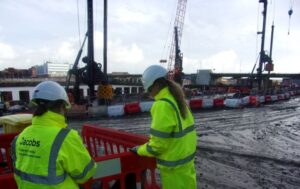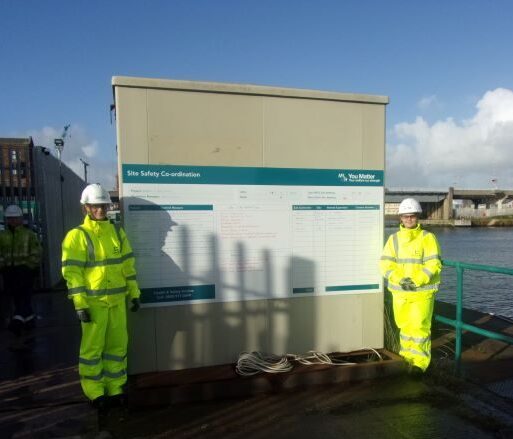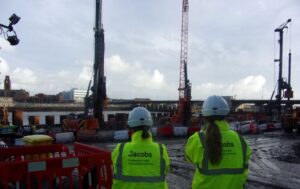In the second of two articles around apprenticeships, SHP speaks to apprentice Alyssa Williams, and her mentor Paul Gaynon, Head of Decommissioning and Regenerations Solutions at Jacobs, on their experience in health and safety and advice for others joining the industry.
Alyssa and Paul focus on skills you can learn within health and safety, but also the exposure to wider fields that an apprenticeship can provide.
SHP: Hi Alyssa, What made you want to choose an apprenticeship in HSE?
 Alyssa Williams (AW): I wanted to go into health and safety after spending a week’s worth of work experience at Stobarts based in Workington, near where I live.
Alyssa Williams (AW): I wanted to go into health and safety after spending a week’s worth of work experience at Stobarts based in Workington, near where I live.
I wasn’t too sure on what I wanted to do for a career, so I thought getting some work experience underneath my belt would help and wanted to try the construction industry. At Stobarts, I spent a day with the health and safety team, and after that I ended up spending the rest of my time on work experience with health and safety because I really enjoyed it.
It was something that I didn’t realise I would enjoy – I was pleasantly surprised. I used to think it was very black and white and there wasn’t as much to it, but that work experience really opened my eyes to it being a diverse career.
SHP: Could you describe the structure of the apprenticeship; what’s your day-to-day like?
AW: It’s ever changing. It’s constantly moving, there’s always something new coming around the corner, but that’s what I really like about the role – you never know what to expect.
In terms of my tasks, I normally have a team meeting with the rest of the health and safety team on the project that I’m working on, and I’ll be set one or two large tasks to focus on throughout the week. Those are the priority tasks with higher importance and then, alongside these are smaller tasks. For example, the weekly inspection, or toolbox talks, or audits, stakeholders or any wellbeing work we have running at the time. The list goes on.
SHP: What has been your biggest achievement or proudest moment within the apprenticeship so far?
AW: My proudest moment is public speaking for the Toolbox Talks. I try to make sure I keep everything at a common understanding across the board to make sure it’s clearly understood. Communication in health and safety is about being inclusive with language.
My biggest achievement was something I never thought I’d be able to do, which was challenging another person’s behaviour. Especially when you’re new to the role, new to the construction site and you are around people who are subject matter experts in their discipline.
Correcting someone’s unsafe behaviour is quite a daunting task. Unsafe working tends to be a result of operatives taking shortcuts to complete certain tasks – it’s all about being able to speak up, address, and resolve the issue rather than risking someone’s health, safety, and wellbeing just to ‘get the job done faster’.

SHP: Have you learnt anything outside of HSE which you didn’t expect?
AW: Definitely, I’ve learnt a lot more to do with different disciplines, learning about electrical and mechanical areas which have benefitted me in my learning. For example, if I attend a stakeholder meeting, and they’re talking about elements involved with the electrical processes, I now understand the area in more depth and the overall development a lot better more.
But other than that, I’ve learnt more about other topics through training that’s been provided. For example, training around mental health and the different related topics. Promoting this is big on-site and potentially bigger within the Jacobs family. I’ve managed to take that learning and apply it to my home life, my daily routine, and my job. So, I’ve learned a lot other than health and safety that I didn’t expect I would.
SHP: That sounds really diverse! So would you like to continue in HSE after your apprenticeship?
AW: I definitely see myself staying in health and safety. I plan on successfully smashing this apprenticeship! That’s my initial goal.
And then after that I would like to go on to get my NEBOSH diploma so I can get a degree in health and safety, along with gaining more experience focusing in different areas. Once I have successfully gained my diploma, I want to become a subject matter expert, maybe looking into COSHH, confined spaces or fire safety. Right now, I am intrigued by confined spaces but whether that changes in a couple of years’ time, we’ll have to wait and see.
SHP: What advice would you give to someone considering an apprenticeship in HSE?
AW: I would definitely say try and gain some experience in the subject prior to going for it. I know that even for me personally, I feel there is a general belief that health and safety is black and white, and I can confirm that is positively not the case!
There’s a lot that comes with the role in terms of different skills. You’re expected to be diverse and have the ability to adapt. Soft people skills are essential, such as being good at communication and emotional intelligence, but then the next day you might be investigating an incident. In that investigation you might have to hold someone accountable for actions that have been taken, and so it’s very diverse in that sense.
You also learn a lot about people and mental health – there’s just loads to consider when thinking about a role in health and safety, and you must make sure that you are fit for the role and you’re ready to take on the responsibility because it is quite challenging at times. As challenging as it is, it is equally as rewarding. There’s lots to achieve in it as well and it opens doors for you.
SHP: And for you Paul, could you give us a brief overview of your role? Do you enjoy it?
Paul Gaynon (PG): Yes sure, I’m the Head of HSE for the Decommissioning and Regeneration Solutions business within Jacobs which is made up of around 2500 people, and I help to provide HSE support to the business operations and project delivery teams.
 In terms of my role, it’s about helping to manage projects, we’ve got teams out on-site with key customers and clients all around the UK, overseas in Europe and Japan as well. They all help customers solve problems and provide solutions to their critical missions in nuclear decommissioning and regeneration projects on-site.
In terms of my role, it’s about helping to manage projects, we’ve got teams out on-site with key customers and clients all around the UK, overseas in Europe and Japan as well. They all help customers solve problems and provide solutions to their critical missions in nuclear decommissioning and regeneration projects on-site.
We also plan new projects and develop bids for new projects, identify training requirements including behavioural safety programmes to support Jacobs Beyond Zero Program and the Culture of Caring, and providing training for teams on site as well as those supporting. Along with responding to events and carrying out audits and inspections on-site with those teams, so it’s very varied and diverse.
We’ve got a fantastic HSE team that we work with and help to develop like Alyssa. We’ve had a couple of people who have joined without any experience, and we aim to get them through the IOSH membership and through to chartership. Seeing that development within the team, getting people through the different stages of their career, is great to be a part of.
We’ve had the honour of arranging an awards presentation for the teams as well to ensure recognition of HSE performance is highlighted. We provide presentations to business management and wider leadership teams within the company, to ensure their involvement with the health and safety programme and recognise the role that leaders play in setting the safety culture and supporting the Beyond Zero program.
As Alyssa mentioned, there’s a big push on mental health awareness and there was a Safety Week across the company in October too. So again, there’s a lot of variety in the role, and it’s very satisfying.
SHP: Why are apprentices so valuable to health and safety?
PG: I think it’s the perspective that they bring to the organisation as well as the diversity. Traditionally in HSE you’ve got people who’ve come into a health and safety career from other craft or business areas where they’ve stepped across and taken an interest in it.
I started myself in environment and health and safety as a first career and stuck with it, but I think from the apprentices’ point of view, you’ve got their different perspectives on the use of technology, and different ways messages are communicated and received which can only be of benefit and enhance safety.
So, there’s a lot of areas where the apprentices can bring that background into the profession, and I think it’s very refreshing. Understanding and applying health and safety requirements such as that provided through the apprenticeship provides a solid foundation for any future development and career path.
When I was younger there wasn’t the same level of awareness about health and safety and certainly not a career, so it goes to show how far the messages have spread now within society and how much safety training and awareness is available in schools and colleges.
SHP: Where do you want to see the sector in 10 years’ time?
PG: I think there will be more technology in the future with artificial intelligence coming through, and also, a focus on how quickly we can share learning from near misses and incidents – both within a company and as a profession – faster, so there’s real-time learning that can be shared to prevent incidents on other sites.
As Alyssa mentioned about confined spaces, using advanced technology to avoid people having to go into a confined space or generally working in high hazard areas is an area where there are exciting developments.
As well as technology, safety is about people and helping to get an increased focus on safety culture and helping people to get more engaged in the safety programme is critical.
We’ve still got people performing tasks, so we need to make sure that whatever they do, they’re given the best opportunity they can to do it safely, and a lot is down to planning, hazard spotting and dealing with changes, and getting people’s engagement to report hazards and recognise changes across the board is key to delivering safely.
Further reading/listening:
Advance your career in health and safety
Browse hundreds of jobs in health and safety, brought to you by SHP4Jobs, and take your next steps as a consultant, health and safety officer, environmental advisor, health and wellbeing manager and more.
Or, if you’re a recruiter, post jobs and use our database to discover the most qualified candidates.

 Alyssa Williams (AW): I wanted to go into health and safety after spending a week’s worth of work experience at Stobarts based in Workington, near where I live.
Alyssa Williams (AW): I wanted to go into health and safety after spending a week’s worth of work experience at Stobarts based in Workington, near where I live.
 In terms of my role, it’s about helping to manage projects, we’ve got teams out on-site with key customers and clients all around the UK, overseas in Europe and Japan as well. They all help customers solve problems and provide solutions to their critical missions in nuclear decommissioning and regeneration projects on-site.
In terms of my role, it’s about helping to manage projects, we’ve got teams out on-site with key customers and clients all around the UK, overseas in Europe and Japan as well. They all help customers solve problems and provide solutions to their critical missions in nuclear decommissioning and regeneration projects on-site.